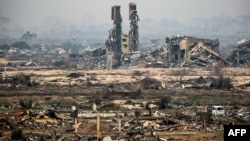Hamas officials accused Israel of violating a ceasefire agreement Monday and threatened to delay releasing more hostages, prompting U.S. President Donald Trump to say “all hell is going to break out” if all the remaining hostages are not turned over by Saturday.
The next exchange was set for Saturday, with three more Israelis set to be freed in exchange for hundreds of Palestinian prisoners jailed by Israel.
A spokesperson for Hamas' armed wing, the al-Qassam Brigades, said in a statement the militants remain committed to the ceasefire terms “as long as the occupation adheres to them.”
Hamas accused Israel of delaying the return of displaced Palestinians to northern Gaza, although hundreds of thousands have returned. The group said Palestinians were targeted “with airstrikes and gunfire across various areas” and Israel has failed “to facilitate the entry of humanitarian aid as agreed.”
However, a United Nations official said 12,600 humanitarian aid trucks have entered Gaza since the ceasefire began and the immediate threat of famine has dissipated.
Israeli Defense Minister Israel Katz said any delay by Hamas would be “a complete violation” of the ceasefire agreement. He placed the Israeli military on the highest level of alert.
In Washington Monday, Trump said he would propose canceling the ceasefire agreement if all the remaining hostages being held in Gaza were not released by 12 o’clock Saturday, but he did not specify whether that was noon or midnight, and he did not indicate a time zone.
He also said he might withhold aid to Jordan and Egypt if they don't take Palestinian refugees being relocated from Gaza.
Since the ceasefire took effect last month, Hamas has freed 21 hostages while Israel has released more than 730 prisoners.
Trump has proposed moving Palestinians living in Gaza to an unspecified location outside the territory. Under his plan for the enclave, they would have no right to return.
In an interview with Fox News released Monday, he called his plan for the narrow territory along the shores of the Mediterranean Sea a "real estate development for the future."
“I would own it," he said, adding that the 2.3 million Palestinians now living in war-ravaged Gaza would be moved to as many as six different sites outside Gaza under a plan that the Arab world, as well as U.S. allies and adversaries alike, have already rejected.
Trump, a billionaire New York real estate magnate before entering politics in 2015, did not say where the Palestinians would be relocated. But when asked by Fox anchor Bret Baier if they would be allowed to return home to Gaza, Trump said, "No, they wouldn't, because they're going to have much better housing."
"In other words, I'm talking about building a permanent place for them because if they have to return now, it'll be years before you could ever — it's not habitable,” Trump said of Gaza, decimated by 15 months of fighting between Israel and Hamas.
In the Fox interview, Trump said he would build "beautiful communities" for the Palestinians.
"Could be five, six, could be two. But we'll build safe communities, a little bit away from where they are, where all of this danger is," Trump said.
On Sunday, Israeli troops withdrew from the Netzarim corridor, a narrow strip of land that bisects the territory. It allowed more Palestinians to return to the northern sector where they once lived, but much of the land has been leveled by fighting.
Hamas spokesperson Abdel Latif Al-Qanoua said the withdrawal showed Hamas had "forced the enemy to submit to our demands" and that it thwarted Israeli Prime Minister Benjamin Netanyahu's “Illusion of achieving total victory."
Israeli officials did not disclose how many soldiers withdrew or to where. Troops currently remain along Gaza's borders with Israel and Egypt and a full withdrawal is expected to be negotiated in a later stage of the initial 42-day ceasefire.
During the first six-week phase of the ceasefire, Hamas is gradually releasing 33 Israeli hostages captured during its Oct. 7, 2023, attack on Israel in exchange for a pause in fighting, freedom for hundreds of Palestinian prisoners and a flood of humanitarian aid into Gaza. The deal also stipulated that Israeli troops would pull back from populated areas of Gaza as well as the Netzarim corridor.
In the second phase, all remaining living hostages would be released in return for a complete Israeli withdrawal from Gaza and a "sustainable calm." But details are unclear and yet to be negotiated.
The war in Gaza was triggered by the shock October 2023 Hamas terror attack on Israel that killed 1,200 people and led to the capture of 250 hostages. Israel’s counteroffensive killed more than 47,000 Palestinians, more than half of them women and children, according to local health authorities. Israel says the death toll includes 17,000 militants it has killed.
Some information for this report came from The Associated Press, Agence France-Presse and Reuters.





